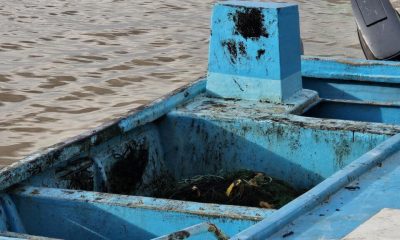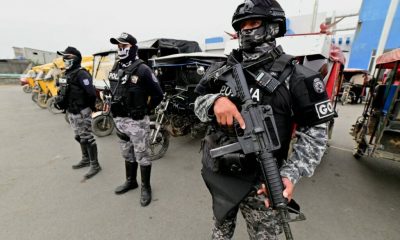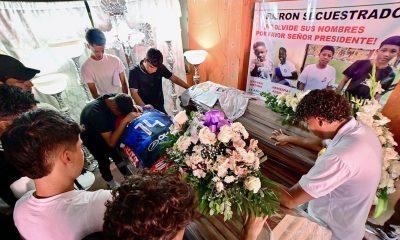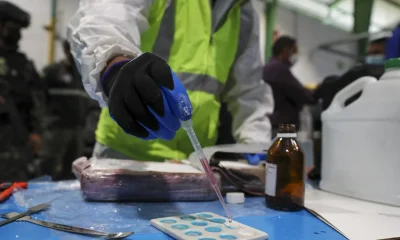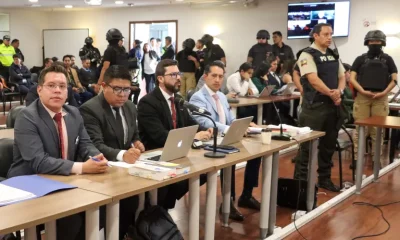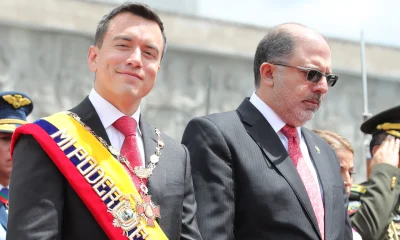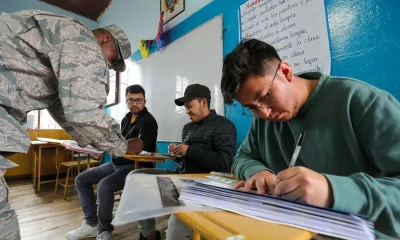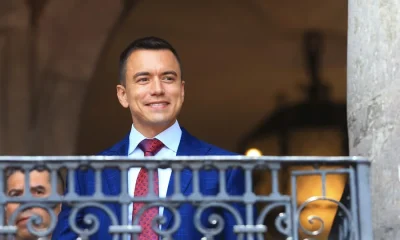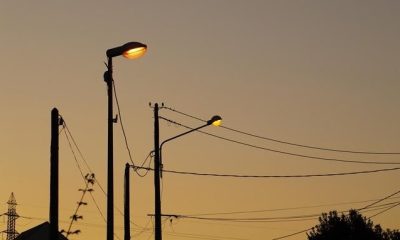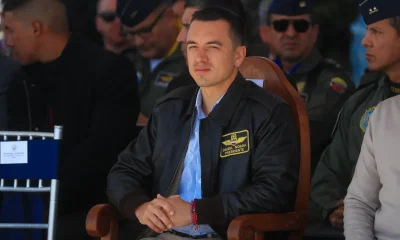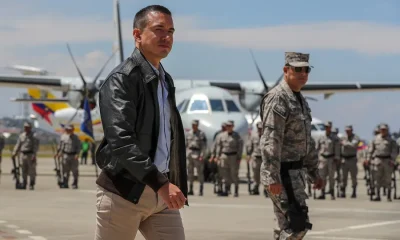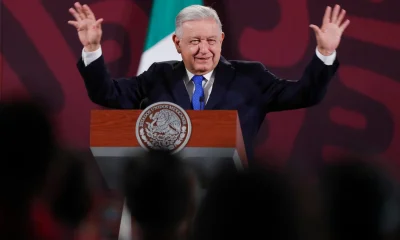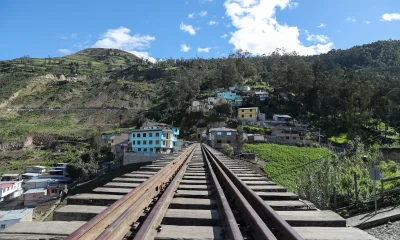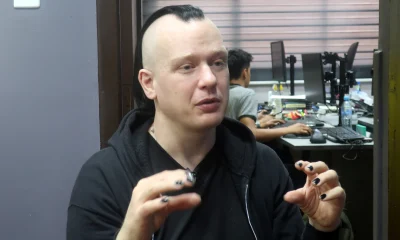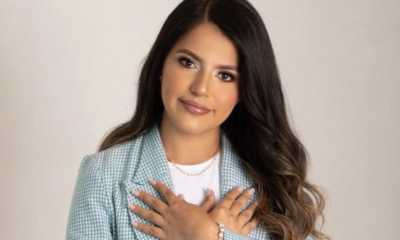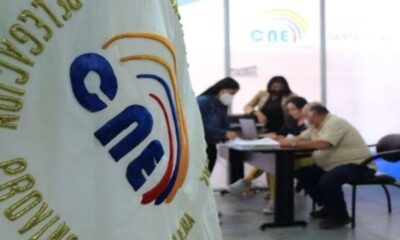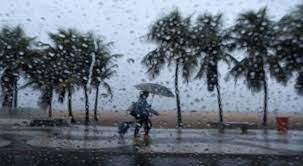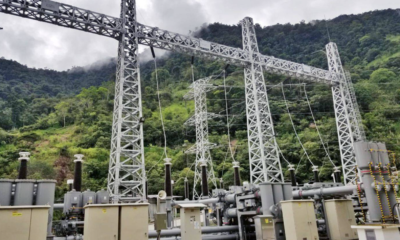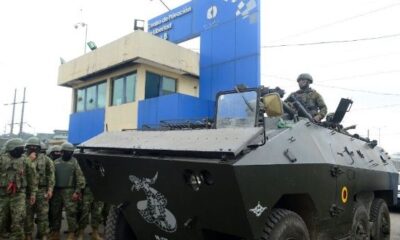International
Noboa assures that Ecuador has a new face with more security after six months in office
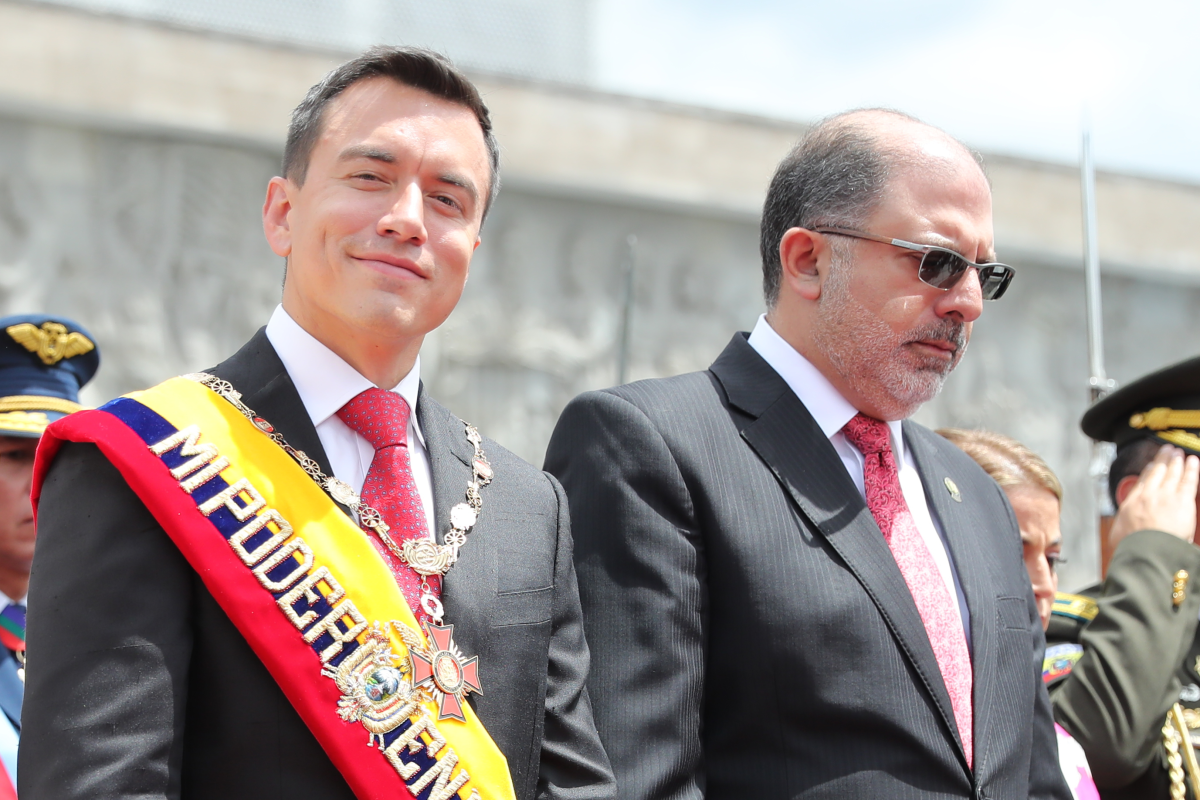
The president of Ecuador, Daniel Noboa, assured this Friday in his first report to the nation that, in the six months of his mandate, he has achieved a country with a new face thanks to efforts to combat insecurity and for the recovery of institutionality.
In his message to the National Assembly (Parliament), a day after having served six months as head of state, Noboa asserted that he received a country “with fear and without hope,” so he had to take “hard” decisions that other administrations did not dare, in search of a safe country, open to investments, job creation and to “guaranteee the future of all.”
The president said that last January 9 will be a date that the country will not forget, having revealed the scope of “the horror of terrorism”, with a series of attacks and violent actions of organized crime such as the taking of the TC Televisión channel by a group of armed men and simultaneous riots in various prisons with about 200 hostages.
That day, on which he again denounced an attempted coup d’état against him, Noboa declared the “internal armed conflict” against 22 criminal gangs linked to drug trafficking, whom he called terrorists.
The actions of the Government, he said, seek to “start building a country where tranquility and progress are the norm and not the exception.”
He highlighted the commitment and sacrifice of the security forces to fight the mafias that “have accomplices and allies, at all levels of the country: public institutions, public companies, local governments, in our neighborhoods, they are everywhere.”
Despite the changes he reported about, Noboa said that the fight for “the ‘New Ecuador’ has only begun,” he pointed out that social transformation and security are also achieved “with employment, education, with services and empathy” with social actions that reveal “the face of a new Ecuador that grows.”
In that line, he also mentioned the efforts in the energy field of his Government, which in April had to face blackouts in the face of a serious electricity crisis, due to the drought of one of the main hydroelectric complexes in the country.
“We are working very hard to solve the energy crisis, in such a way that Ecuadorians, in the future, do not have to go through more energy rationing. In other words, we are cleaning up what those of the past mudded,” he said.
In the economic area, Noboa mentioned the existence of 105,000 young employment places, the ratification of two trade agreements (with China and Costa Rica) and the reduction of 1,000 points in the risk premium.
Noboa claimed to have recovered the country’s institutionality by asserting that “the new Ecuador does not deal with drug trafficking, drug policy, terrorists or any of its historical costumes.”
“The new Ecuador also does not give in to external pressures or even from citizens who call themselves Ecuadorians and even want their country to be sentenced,” he said, without referring to any specific person, although the day before he sent on social networks “to cry to tears” to former President Rafael Correa for his statements regarding the crisis with Mexico.
Noboa did not speak in his speech about the assault on the Mexican Embassy in Quito in April, to capture Jorge Glas, former vice president of Rafael Correa, which caused the breakdown of relations with the Mexican Government, as well as the almost unanimous condemnation of the international community.
After that assault, Correa considered that the country should receive pressure from the international community at the political and legal level as a precedent so that a similar situation does not happen again.
Noboa committed himself to his compatriots to “not go back” and “never stay in the problem or in the comfort of the excuse,” but to move forward to “find and travel clean roads that allow the problems of Ecuadorians to be solved.”
And he explained that he follows the lessons that formed his generation: “to be strong so that no one defeats you, to be noble so that no one humiliates you, to be humble so that no one offends you and to continue to be you so that no one forgets you.”
“In just six months we are achieving what other governments did not do in two, nor four, or ten years,” he said.
International
Thousands rally nationwide against Trump’s threat to U.S. democracy

Thousands of protesters gathered on Saturday (April 19, 2025) in major cities like New York and Washington, as well as in small communities across the United States, in a second wave of demonstrations against President Donald Trump. The crowds denounced what they view as growing threats to the country’s democratic ideals.
In New York City, demonstrators of all ages rallied in front of the Public Library near Trump Tower, holding signs accusing the president of undermining democratic institutions and judicial independence.
Many protesters also criticized Trump’s hardline immigration policies, including mass deportations and raids targeting undocumented migrants.
“Democracy is in grave danger,” said Kathy Valyi, 73, the daughter of Holocaust survivors. She told AFP that the stories her parents shared about Adolf Hitler’s rise to power in 1930s Germany “are happening here now.”
In Washington, demonstrators voiced concern over what they see as Trump’s disregard for long-standing constitutional norms, such as the right to due process.
International
ACLU seeks emergency court order to stop venezuelan deportations under Wartime Law

The American Civil Liberties Union (ACLU) on Friday asked two federal judges to block the U.S. government under President Donald Trump from deporting any Venezuelan nationals detained in North Texas under a rarely used 18th-century wartime law, arguing that immigration officials appear to be moving forward with deportations despite Supreme Court-imposed limitations.
The ACLU has already filed lawsuits to stop the deportation of two Venezuelan men held at the Bluebonnet Detention Center, challenging the application of the Alien Enemies Act of 1798. The organization is now seeking a broader court order that would prevent the deportation of any immigrant in the region under that law.
In an emergency filing early Friday, the ACLU warned that immigration authorities were accusing other Venezuelan detainees of being members of the Tren de Aragua, a transnational criminal gang. These accusations, the ACLU argues, are being used to justify deportations under the wartime statute.
The Alien Enemies Act has only been invoked three times in U.S. history — most notably during World War II to detain Japanese-American civilians in internment camps. The Trump administration has claimed the law allows them to swiftly remove individuals identified as gang members, regardless of their immigration status.
The ACLU, together with Democracy Forward, filed legal actions aiming to suspend all deportations carried out under the law. Although the U.S. Supreme Court recently allowed deportations to resume, it unanimously ruled that they could only proceed if detainees are given a chance to present their cases in court and are granted “a reasonable amount of time” to challenge their pending removal.
International
Dominican ‘False Hero’ Arrested for Faking Role in Nightclub Collapse That Killed 231

A man identified as Rafael Rosario Mota falsely claimed to have rescued 12 people from the collapse of the Jet Set nightclub in Santo Domingo—a tragedy that left 231 people dead—but he was never at the scene.
Intelligence agents in the Dominican Republic arrested the 32-year-old man for pretending to be a hero who saved lives during the catastrophic incident, authorities announced.
Rosario Mota had been charging for media interviews in which he falsely claimed to have pulled survivors from the rubble after the nightclub’s roof collapsed in the early hours of April 8, during a concert by merengue singer Rubby Pérez, who was among those killed.
“He was never at the scene of the tragedy,” the police stated. The arrest took place just after he finished another interview on a digital platform, where he repeated his fabricated story in exchange for money as part of a “media tour” filled with manipulated information and invented testimonies.
“False hero!” read a message shared on the police force’s Instagram account alongside a short video of the suspect, in which he apologized: “I did it because I was paid. I ask forgiveness from the public and the authorities.”
-

 Central America5 days ago
Central America5 days agoPetro questions Ecuador’s vote, cites reports of military control and arrests
-

 International4 days ago
International4 days agoArsenal stun Real Madrid at the Bernabéu to reach Champions League semifinals
-

 International3 days ago
International3 days agoDominican ‘False Hero’ Arrested for Faking Role in Nightclub Collapse That Killed 231
-

 Central America3 days ago
Central America3 days agoNicaraguan Exiles to Mark 7th Anniversary of 2018 Protests with Global Commemorations
-

 International4 days ago
International4 days agoBogotá residents line up for yellow fever vaccine amid national alert
-

 International2 days ago
International2 days agoACLU seeks emergency court order to stop venezuelan deportations under Wartime Law
-

 International4 days ago
International4 days agoDeSantis’ immigration crackdown sparks alarm in Venezuelan Communities in Doral
-

 Central America2 days ago
Central America2 days agoUN complaint filed against Costa Rica over detention of migrant children
-

 International4 days ago
International4 days agoMexico refuses to restore ties with Ecuador while Noboa remains in office
-

 International15 hours ago
International15 hours agoThousands rally nationwide against Trump’s threat to U.S. democracy
-

 International5 days ago
International5 days agoColombia: Search continues for missing limb of italian scientist found dismembered














